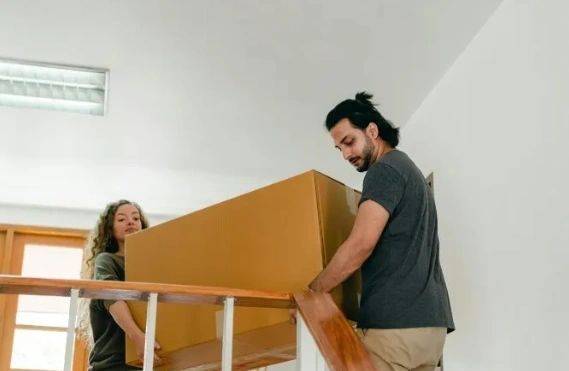BuySellBA
Administrator
Renters in crisis: 37% of Buenos Aires City households rent, leaving young people in housing limbo - La Nacion Propiedades

Source:

 www.ambito.com
www.ambito.com
August 25, 2025
Renters in crisis: 37% of Buenos Aires City households rent, leaving young people in housing limbo.
By Jose Luis Cieri
A private report warned that low wages and a lack of credit are hampering emancipation. Renting a studio apartment costs 52% of a young person's salary.

A young woman moves into her first studio apartment in the city, a step toward independence that requires spending more than half of her salary on rent.Image Artificial Intelligence
Thirty-seven percent of households in the City of Buenos Aires rent , the highest proportion in the country. The Institute for Future Urban Challenges (IDUF) warned that this phenomenon reflects a structural transformation: renting has ceased to be a temporary period and has become a permanent condition for many young people.
The Urban Listening: The Limbo of Young Renters report , prepared in 2025 based on focus groups, revealed that younger generations are facing increasing difficulties in leaving the family home and maintaining a rental contract . The research also includes testimonies showing how job insecurity, lack of mortgage credit, and the high demands of the private market have made independence an increasingly difficult goal.
While rental prices stabilized in the last few years , the income imbalance is evident. According to the IDUF Emancipation Index, renting a studio apartment alone required 52% of a formally employed young person's salary. In the case of cohabiting, a two-room apartment represented 35% of the combined income of two young people. In both scenarios, the percentages exceed the international threshold of 30% recommended as an affordability limit.
"Young people are trapped: they can't afford to own property because of the price of housing, and they can't afford to rent on a permanent basis because their salaries aren't enough," explained Manuel Socías , director of IDUF.
This network not only facilitates the search but also allows you to overcome formal requirements. Young people who lack property security access informal contracts or direct agreements with owners who accept flexible conditions. But when this network doesn't exist, the alternatives are limited: abusive contracts with dollar deposits, family-run hotels, or guesthouses where lack of privacy and poor living conditions are common.
Lucía, 29, described her time in a boarding house in Constitución: “You share the bathroom and the kitchen; there are no amenities, nor is there the ability to decide who enters the space where you live.”
This continuity creates what the report calls a "generational funnel": while grandparents or parents were able to buy or inherit homes, today's young people must resign themselves to renting in a more demanding and expensive market. "Our grandparents managed to become homeowners; our parents still had that chance. We're increasingly far away," said Luca, 24 , who rents in Monserrat.
Gabriela Tavella , a researcher at IDUF, analyzed: “The upper classes have an easier time meeting the requirements of the formal market. Young people from home-owning families have support networks that others don't. This gap widens over time and turns renting into a structural problem.”

In addition to the costs of a new contract, every tenant or couple must consider the costs of moving.
Luca added: “My friends who live in a studio apartment in Caballito or Banfield pay exactly the same: almost 50% of their salaries go to rent.”
The report concludes that emancipation is not only determined by the economy but also by the inability to choose where to live. Many accept the neighborhood they can afford, even if it doesn't meet their expectations of safety, connectivity, or tranquility.
The proposal includes building on public land, converting public buildings, and using vacant legacy properties. Properties resulting from urban development agreements could also be added. Socías stated: "Increasing public supply would help contain price increases and provide predictability for young people who currently cannot plan for their future."
The report warns that during the pandemic, a missed opportunity was experienced in downtown Buenos Aires: property prices reached an all-time low, but no public procurement plan was implemented to allocate them to social housing.
Even those who manage to become independent face another challenge: meeting daily expenses. Several young people reported having to give up cultural, sports, or recreational activities to be able to pay rent and utilities.
Cohabitation appears to be a cost-cutting strategy, although it's not always a desirable choice. Martín, 27 , summed up the situation: "Renting represents 35% of my income, and so does my partner. If I were alone, I'd go back to my mom's place."
Without public policies that expand access and reduce barriers to access, the path to independence will remain uncertain.
Tavella concluded: "Renting is no longer a path to homeownership and has become a structural problem. For those who come from renting families, everything is more difficult: in addition to not having the right to own a home, they have fewer opportunities to receive financial assistance."
www.buysellba.com

Source:

Inquilinos en crisis: un 37% de los hogares de CABA alquila y los jóvenes quedan en un limbo habitacional
Un informe privado advirtió que salarios bajos y falta de crédito frenan la emancipación. Alquilar un monoambiente demanda el 52% de un salario joven.
August 25, 2025
Renters in crisis: 37% of Buenos Aires City households rent, leaving young people in housing limbo.
By Jose Luis Cieri
A private report warned that low wages and a lack of credit are hampering emancipation. Renting a studio apartment costs 52% of a young person's salary.

A young woman moves into her first studio apartment in the city, a step toward independence that requires spending more than half of her salary on rent.Image Artificial Intelligence
Thirty-seven percent of households in the City of Buenos Aires rent , the highest proportion in the country. The Institute for Future Urban Challenges (IDUF) warned that this phenomenon reflects a structural transformation: renting has ceased to be a temporary period and has become a permanent condition for many young people.
The Urban Listening: The Limbo of Young Renters report , prepared in 2025 based on focus groups, revealed that younger generations are facing increasing difficulties in leaving the family home and maintaining a rental contract . The research also includes testimonies showing how job insecurity, lack of mortgage credit, and the high demands of the private market have made independence an increasingly difficult goal.
Job insecurity and rent
The situation of young people is as precarious as that of the rest of the population: informal employment and low wages predominate, aggravated by the fact that, due to their lack of experience and training, they receive lower wages and access more unstable jobs. In Buenos Aires City, the deterioration has worsened in recent years: employment has fallen, the proportion of those earning a salary has decreased, and job insecurity has increased.While rental prices stabilized in the last few years , the income imbalance is evident. According to the IDUF Emancipation Index, renting a studio apartment alone required 52% of a formally employed young person's salary. In the case of cohabiting, a two-room apartment represented 35% of the combined income of two young people. In both scenarios, the percentages exceed the international threshold of 30% recommended as an affordability limit.
"Young people are trapped: they can't afford to own property because of the price of housing, and they can't afford to rent on a permanent basis because their salaries aren't enough," explained Manuel Socías , director of IDUF.
Survival strategies
The report shows that family and friendship networks play a decisive role in accessing housing. Nearly half of the young people surveyed entered the rental market through personal contacts , compared to a much smaller percentage who did so through real estate agencies or online portals.This network not only facilitates the search but also allows you to overcome formal requirements. Young people who lack property security access informal contracts or direct agreements with owners who accept flexible conditions. But when this network doesn't exist, the alternatives are limited: abusive contracts with dollar deposits, family-run hotels, or guesthouses where lack of privacy and poor living conditions are common.
Lucía, 29, described her time in a boarding house in Constitución: “You share the bathroom and the kitchen; there are no amenities, nor is there the ability to decide who enters the space where you live.”
The inheritance of the tenancy
One of the most significant findings is the intergenerational reproduction of the renting condition. Fifty percent of those who rent today are children of renters, marking a break from previous generations who were able to become homeowners.This continuity creates what the report calls a "generational funnel": while grandparents or parents were able to buy or inherit homes, today's young people must resign themselves to renting in a more demanding and expensive market. "Our grandparents managed to become homeowners; our parents still had that chance. We're increasingly far away," said Luca, 24 , who rents in Monserrat.
Gabriela Tavella , a researcher at IDUF, analyzed: “The upper classes have an easier time meeting the requirements of the formal market. Young people from home-owning families have support networks that others don't. This gap widens over time and turns renting into a structural problem.”
The impact of geography
Location also widens inequalities. Young people who migrate from the suburbs or other provinces find costs equivalent to those in Buenos Aires, without substantial improvements in their quality of life. Some value the cultural offerings and educational opportunities in the city, but warn that the price of rent negates any advantages.
In addition to the costs of a new contract, every tenant or couple must consider the costs of moving.
Luca added: “My friends who live in a studio apartment in Caballito or Banfield pay exactly the same: almost 50% of their salaries go to rent.”
The report concludes that emancipation is not only determined by the economy but also by the inability to choose where to live. Many accept the neighborhood they can afford, even if it doesn't meet their expectations of safety, connectivity, or tranquility.
Policies and proposals
The IDUF proposes that the State should intervene in the supply. The creation of a Public Housing Bank would allow for the creation of a rental market outside the private market, with lower and more predictable prices.The proposal includes building on public land, converting public buildings, and using vacant legacy properties. Properties resulting from urban development agreements could also be added. Socías stated: "Increasing public supply would help contain price increases and provide predictability for young people who currently cannot plan for their future."
The report warns that during the pandemic, a missed opportunity was experienced in downtown Buenos Aires: property prices reached an all-time low, but no public procurement plan was implemented to allocate them to social housing.
The future in suspense
The dream of owning a home remains a constant in the minds of young people, although it's becoming increasingly distant. Despite the pessimism, young people see real estate as a safe investment. When asked what they would do if they received an unexpected sum of money, they all responded that they would use it for land or apartments. Facundo, 30 , said: "I would buy two apartments to renovate and rent them out as an investment."Even those who manage to become independent face another challenge: meeting daily expenses. Several young people reported having to give up cultural, sports, or recreational activities to be able to pay rent and utilities.
Cohabitation appears to be a cost-cutting strategy, although it's not always a desirable choice. Martín, 27 , summed up the situation: "Renting represents 35% of my income, and so does my partner. If I were alone, I'd go back to my mom's place."
Generational challenge
Residential emancipation has become a structural challenge for young people in Buenos Aires. Low wages, informal employment, and high rental prices create a "housing limbo" that affects not only the present but also the life trajectories of an entire generation.Without public policies that expand access and reduce barriers to access, the path to independence will remain uncertain.
Tavella concluded: "Renting is no longer a path to homeownership and has become a structural problem. For those who come from renting families, everything is more difficult: in addition to not having the right to own a home, they have fewer opportunities to receive financial assistance."
www.buysellba.com

